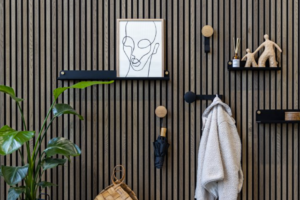A man born in a place where people only wear red sunglasses travels to a distant land where people only wear blue sunglasses. He stays for several years and slowly his sunglasses change color.
 |
|
Michael Volpe and a local kindergarten teacher dressed in traditional clothing of the Shangaan tribe. The clothes aren’t worn everyday, they are worn for special occasions or just to celebrate culture. |
Upon returning to his native country, what color were his sunglasses?
The answer, as I’ve come to learn, is purple. This story was read to me and eighty-four other Americans in August 2005, just days before we stepped on a plane bound for South Africa to begin our lives as Peace Corps Volunteers. Two years and two months later, I returned to the place of my childhood and saw firsthand the wisdom of the riddle.
Born and raised in Irvington, I grew to regard my life as sheltered. It’s a small town with a small school district in a small community. Upon graduating Irvington High in 2001, I followed the path of many of my peers and went to college; I chose SUNY College at Geneseo and declared Physics as a major. It’s a small program in a small liberal arts school in a small town. During my senior year, when everyone asked, "What are you going to do now?", I had doubts about pursuing Physics any further and a nagging feeling of a much larger world out there. I chose to remove myself from the bandwagon of institutionalized education and gain an education in real life.
Applying for the Peace Corps, I made no preference as to where in the world to be sent, and stated for my background and skills to be used for any projects available the following summer. I accepted the first invitation I received, to South Africa.
Perhaps the most unique aspect of serving in the Peace Corps is gaining a new perspective of your own country, and your former life. Just as we Americans hear "Africa" and picture lions, rampant poverty and babies with inflated bellies, Africans have their own vision of America. "Do you know 50 Cent?" and "Are you friends with R. Kelly?" were common questions posed to me by rural South Africans who want to bring validation to the images they see on television. Yes, many rural South Africans have television. In fact, what little exposure they have to "the land of the free" is comprised of our pop-artists, movie stars, president and professional wrestlers. What comes across strongest is America’s celebrity status, love of lavish things, and wealth.
Since the second goal of Peace Corps is to help promote a better understanding of Americans on the part of peoples served, how could I explain that most Americans are not who we appear to be on television? I spent a lot of time trying to eliminate stereotypes through conversation, but my mere presence in a rural village for two years demonstrated more than words could portray. I lived in the same houses and ate the same foods as my counterparts. I learned the local language and embraced traditional customs. My interactions led to a deep and meaningful understanding of a people and a way of life I had previously not known to exist. Once I had shown an active interest in the culture of my counterparts, they became interested in learning about my own.
Many of the values and habits I adopted while being immersed in a foreign culture have kept with me. The first day home I opened the refrigerator and stared. "There’s just so much," I explained to my mother. The fridge in South Africa that I used was typically occupied by half a dozen eggs, water, a few carrots, tomatoes and a package of meat to be cooked that day or the next. The excess astounded me, and not just in the kitchen. Everywhere I looked there was stuff. A closet of clothes which I had survived comfortably without for years, thirty or forty pens and pencils when I was used to three or four, and a case of VHS tapes when I couldn’t recall the last time I owned a VCR. Living was a lot simpler when I was away.
Recognizing that my friends and family didn’t go through a similar life-changing experience doesn’t relieve the feeling of being a foreigner in my own country. As the Peace Corps warns, readjusting to life in the U.S. is difficult. Being defined by what you do is a product of our culture that I struggle with daily. The question after, "How was Africa?" is almost always, "What are you going to do now?"
Now, nearly four months since my return, I begin another journey to find an answer to that familiar question. Only this time, I’m wearing purple sunglasses.






